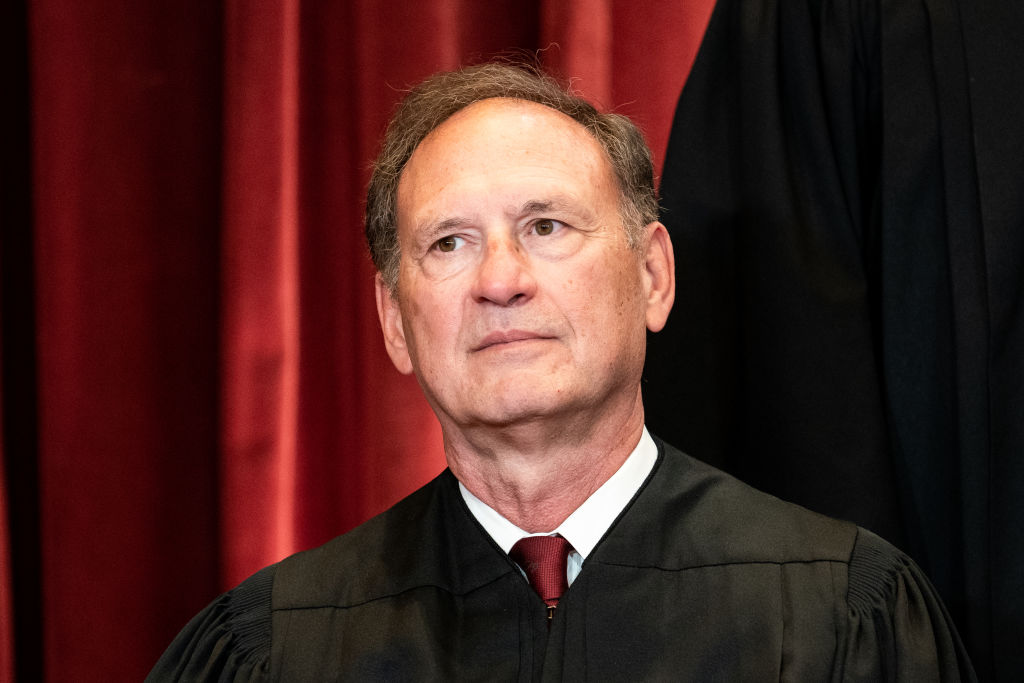
WASHINGTON, DC – APRIL 23: Associate Justice Samuel Alito sits during a group photo of the Justices at the Supreme Court in Washington, DC on April 23, 2021. (Photo by Erin Schaff-Pool/Getty Images)
There have been leaks from the Supreme Court before. None, however, have been of a draft opinion revealing a case’s outcome. The leak of Justice Samuel Alito’s opinion in Dobbs v. Jackson Women’s Health Organization to Politico will have a profound impact on the work of the Supreme Court, as the opinion and ruling will if they hold. This draft was reportedly written in February, and opinions are not final until the Court publishes them. Roe v. Wade had not yet been overturned.
That is what the opinion draft does; it completely rejects and overturns Roe v. Wade and its legacy cases, most prominently Planned Parenthood v. Casey. The prohibition on states penalizing early-term abortions would be over if this opinion holds. It’s a majority opinion written by Alito and agreed to by Justices Thomas, Gorsuch, Kavanaugh, and Coney Barrett. Josh Gerstein, one of two reporters who broke the story, appeared on television Monday night and said the source did not know Chief Justice Roberts’ vote.
As per the draft, Alito writes:
“We hold that Roe and Casey must be overruled. The Constitution makes no reference to abortion, and no such right is implicitly protected by any constitutional provision, including the one on which the defenders of Roe and Casey now chiefly rely-the Due Process Clause of the Fourteenth Amendment.”
He explains that the clause had been held to guarantee rights not explicitly mentioned in the Constitution, but only those “deeply rooted in this Nation’s history and tradition” and “implicit in the concept of ordered liberty.” And then, he spends many pages demonstrating that elective abortion was never so rooted. It was almost universally prohibited instead and, therefore, cannot be protected by the Due Process Clause.
Justice Alito says the court in Casey mistakenly affirmed Roe due to stare decisis, a legal principle which means to “to stand by things decided.” He writes, “proper application of stare decisis required an assessment of the strength of the grounds on which Roe was based.” Alito writes:
“The inescapable conclusion is that a right to abortion is not deeply rooted in the Nation’s history and traditions. On the contrary, an unbroken tradition of prohibiting abortion on pain of criminal punishment persisted from the earliest days of the common law until 1973.”

The draft opinion goes out of its way to mention its limitations. Justice Alito cautions in several places; the opinion only concerns whether prohibitions on abortions are allowed, not when life begins, or what restrictions a state should or should not impose. He wrote, “our decision is not based on any view about when a State should regard pre-natal life as having rights or legally cognizable interests,” for instance. Later in the opinion, he says, “we thus return the power to weigh those arguments to the people and their elected representatives.”
Alito concludes the draft with a discussion of the likely public reaction to the Court’s opinion, which was one of the reasons given for the result in Casey. He writes, “we cannot exceed the scope or our authority under the Constitution, and we cannot allow our decisions to be affected by any extraneous influences such as concern about the public’s reaction to our work.”
Regarding the leak itself, SCOTUSblog, the gold standard in Supreme Court reporting, tweeted the following Monday night:
It’s impossible to overstate the earthquake this will cause inside the Court, in terms of the destruction of trust among the Justices and staff. This leak is the gravest, most unforgivable sin.
— SCOTUSblog (@SCOTUSblog) May 3, 2022
Ian Samuel, a former law clerk to Justice Antonin Scalia, reports the justice said the following to his clerks on induction day:
“I want to just emphasize something, and I only want to say it once. If I ever discover that you have betrayed the confidences of what goes on in these chambers, I will do everything in my power to ruin your career.”
Early reports indicate that Chief Justice John Roberts will likely order an investigation that involves the FBI.
Remember to check out the web’s best conservative news aggregator
Whatfinger.com — the #1 Alternative to the Drudge

